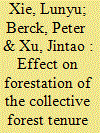|
|
|
Sort Order |
|
|
|
Items / Page
|
|
|
|
|
|
|
| Srl | Item |
| 1 |
ID:
147429


|
|
|
|
|
| Summary/Abstract |
The Chinese government has allowed collective village forest land to pass into individualized ownership. The purpose was to alleviate rural poverty and stimulate investment in forests. Using data collected from 288 villages, in eight provinces, over three years, this paper measures the effect of the individualization on one aspect of forest investment, forestation. Because villages voted on the reform, we identify the causal effect of the reform by an instrumental variable estimator based on the countywide decision to offer the reform package. We find an increase in forestation of 7.68% of forest land in the year of the reform.
|
|
|
|
|
|
|
|
|
|
|
|
|
|
|
|
| 2 |
ID:
192329


|
|
|
|
|
| Summary/Abstract |
Household energy transition is a critical tool for air pollution mitigation and energy inequality reduction. The effectiveness of the transition largely relies on not only households' decision to participate but also their sustained use of clean energy after participation. However, the sustained use of clean energy has not yet received sufficient attention in policy making and in literature. This study examines China's Household Clean Heating program, which has switched millions of households' heating energy sources from coal to electricity and gas. We focus on both households' adoption and coal substitution behavior in the program. Based on the large-scale household survey conducted in rural areas of Northern China, we find that both high subsidies and compulsory measures effectively increased the household adoption rate; however, the latter did not guarantee sustained use of clean energy. We also find that In-person and repeated dissemination of program information had a better effect on involvement than passive announcements. Moreover, lower-income households were less likely to participate. Our findings suggest effective implementation approaches and supplementary measures to promote household energy transition, with fewer negative consequences for participants, particularly for the participants with lower income.
|
|
|
|
|
|
|
|
|
|
|
|
|
|
|
|
| 3 |
ID:
182809


|
|
|
|
|
| Summary/Abstract |
The loss of targeting efficiency due to information asymmetry is a longstanding problem in aid programs. China's Targeted Poverty Alleviation (TPA) program addresses this problem by assigning local government officials to individual impoverished households. These officials, referred to as poverty alleviation coordinators (PACs), are required to pay frequent home visits to the assigned households and to deploy policy resources for poverty reduction. The program is costly in terms of human resources because the officials also have regular duties in a variety of departments. We investigate the effects of the PAC system on poverty alleviation and explore the mechanisms of the effects. Based on the Chinese Poor Population Tracking Dataset and econometric analysis, we find that the households with a larger income increase are those whose PACs work in a department that has the type of resources needed by the household. This indicates that a good match between the resource and the need could enhance the effect of the TPA program. In addition, PACs at a higher position in the governance structure show a larger income increase in their assigned households, which is expected, because a higher position could have more resources to deploy. These findings shed light on role of institutional arrangements in alleviating information asymmetry in poverty reduction programs.
|
|
|
|
|
|
|
|
|
|
|
|
|
|
|
|
| 4 |
ID:
192401


|
|
|
|
|
| Summary/Abstract |
Aiming to alleviate air pollution and carbon emissions from heating, Northern China mandatorily converted household heating energy from coal to electricity (Coal to Electricity), natural gas (Coal to Gas), and clean coal (Clean Coal Replacement). Based on large-scale household survey data in Beijing, this study provides a cost-benefit analysis of the transition program and distinguishes between social and private benefits. The results show that all three programs improve the welfare of society and households. Compared to the Clean Coal Replacement program, Coal to Electricity and Coal to Gas programs provide higher environmental benefits while bringing about larger costs, and thus the benefit-to-cost ratios are lower. We also find that private net benefits are lower than social net benefits, and household satisfaction with the programs is positively determined by private net benefits rather than social net benefits. Furthermore, households with lower income and larger housing areas are more likely to be harmed by the programs by a larger burden from the heating energy transition. These findings call attention to inequity issues during the household energy transition.
|
|
|
|
|
|
|
|
|
|
|
|
|
|
|
|
|
|
|
|
|